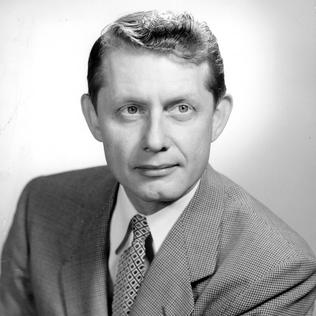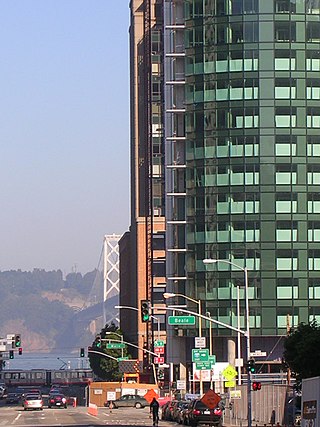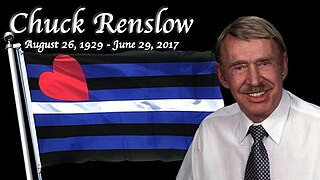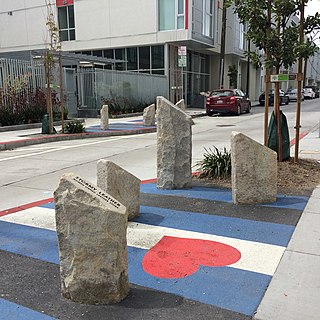| Clementina's Baybrick | |
|---|---|
| Location | 1190 Folsom Street, San Francisco, California, U.S. |
| Coordinates | 37°46′31″N122°24′36″W / 37.775368°N 122.409917°W |
| Active dates | September 1982 – October 4, 1987 |
Clementina's Baybrick, was a lesbian bar, dance club, and hostel in operation from September 1982 to October 1987 in the SoMA neighborhood at 1190 Folsom Street in San Francisco, California. [1] [2] [3] It went by many name variations, including Clementina's Baybrick Inn, Clementina's Bay Brick Inn, The Baybrick, The Bay Brick, and The Brick.
Since 1993, the former Clementina's Baybrick space is known as the Cat Club. [1] [4]
The building is located in part of the historic Leather and LGBTQ Cultural District; [5] and was the former location of The Waiting Arms / Earthquake Ethel's (1974), The Hungry Hole (1976–1977), and Brown's Pub (1980–1983). [5] Clementina's was a bar and dance club, and it was inside the basement of the Baybrick Inn building, a hotel. [2] Clementina's was named after the alley it was near. [1] Lauren Hewitt was the owner and manager, [3] [6] she also was a co-organizer of the Gay/Lesbian Freedom Band Festival, and helped plan the 1984 Folsom Street Fair.
Clementina's Baybrick hosted a variety of entertainment events including comedy open mic nights, cabaret nights, a variety of musical performances, dance parties, tea dances, and lesbian-centered strip shows. [3] On October 23, 1983, the Asian Women's Group (AWG) sponsored a dance event, "A Sunday Bash" which was attended by some 125 women. [7] Les Nickelettes, a feminist satirical performance art troupe had a six-week run (around 1983) during the Clementina's Baybrick Wednesday night cabaret series. [2]
The hostel/inn portion closed in 1984. [3] The bar and dance club closed on October 4, 1987. [3]

A gay village, also known as a gayborhood, is a geographical area with generally recognized boundaries that is inhabited or frequented by many lesbian, gay, bisexual, transgender, and queer (LGBTQ) people. Gay villages often contain a number of gay-oriented establishments, such as gay bars and pubs, nightclubs, bathhouses, restaurants, boutiques, and bookstores.

Leather subculture denotes practices and styles of dress organized around sexual activities that involve leather garments, such as leather jackets, vests, boots, chaps, harnesses, or other items. Wearing leather garments is one way that participants in this culture self-consciously distinguish themselves from mainstream sexual cultures. Many participants associate leather culture with BDSM practices and its many subcultures. For some, black leather clothing is an erotic fashion that expresses heightened masculinity or the appropriation of sexual power; love of motorcycles, motorcycle clubs and independence; and/or engagement in sexual kink or leather fetishism.

Dorothy Louise Taliaferro "Del" Martin and Phyllis Ann Lyon were an American lesbian couple based in San Francisco who were known as feminist and gay-rights activists.

A gay bar is a drinking establishment that caters to an exclusively or predominantly lesbian, gay, bisexual, transgender or queer (LGBTQ+) clientele; the term gay is used as a broadly inclusive concept for LGBTQ+ communities.

South of Market (SoMa) is a neighborhood in San Francisco, California, situated just south of Market Street. It contains several sub-neighborhoods including South Beach, Yerba Buena, and Rincon Hill.

The leather pride flag is a symbol of leather subculture as well as kink and fetish subcultures more broadly, including BDSM. The flag was designed by Tony DeBlase in 1989.

Folsom Street Fair (FSF) is an annual BDSM and leather subculture street fair, held in September that concludes San Francisco's "Leather Pride Week". The Folsom Street Fair, sometimes referred to simply as "Folsom", takes place on the last Sunday in September, on Folsom Street between 8th and 13th Streets, in San Francisco's South of Market district.

Charles "Chuck" Arnett was an American artist and dancer. His best-known work is the Tool Box mural (1962).

Harold Leland "Hal" Call was an American businessperson, LGBT rights activist, and U.S. Army veteran. He served as president of the Mattachine Society and in the 1950s, was one of the first gay activists to speak publicly on television. Call founded printing presses for LGBT publications and later opened gay adult shops and pornographic film screening venues. He received a Purple Heart for his service in the Pacific War.

The lesbian, gay, bisexual and transgender (LGBTQ) community in San Francisco is one of the largest and most prominent LGBT communities in the United States, and is one of the most important in the history of American LGBT rights and activism alongside New York City. The city itself has been described as "the original 'gay-friendly city'". LGBT culture is also active within companies that are based in Silicon Valley, which is located within the southern San Francisco Bay Area.

Folsom Street is a street in San Francisco which begins perpendicular to Alemany Boulevard in San Francisco's Bernal Heights district and ends perpendicular to the Embarcadero on the San Francisco Bay. For its southern half, Folsom Street runs north–south, but it turns northeasterly at 13th street. It runs through San Francisco's Bernal Heights district, Mission District, SoMa District, Yerba Buena District, and South Beach district.

Esta Noche was the first Latino gay bar in San Francisco and notably contributed to queer Latin culture. It operated from 1979 to 2014, and was located at 3079 16th Street between Valencia Street and Mission Street in San Francisco, California.
Maud's was a lesbian bar at 937 Cole Street in San Francisco's Cole Valley neighborhood which opened in 1966 and closed in 1989. At the time of its closing, which was captured in the film, Last Call at Maud's, it was claimed to be the oldest lesbian bar in the United States. Its history, documented in the film and other media, spanned almost a quarter-century of LGBTQ events.

The White Horse Inn is a gay bar located at 6551 Telegraph Avenue in Oakland's Bushrod Park neighborhood. It officially opened in 1933 but is rumored to have operated as a gay speakeasy since before the end of Prohibition. It is said to be the oldest continuously operating gay bar in the United States, along with Cafe Lafitte in New Orleans, Louisiana which has also operated since 1933. The White Horse is situated geographically near the Oakland-Berkeley border and in close proximity to the University of California, Berkeley campus.

The Stud is a gay bar currently located on 1123 Folsom Street in San Francisco.

Charles "Chuck" Renslow was an American businessman, known for pioneering homoerotic male photography in the mid-20th-century US, and establishing many landmarks of late-20th-century gay culture and leather culture, especially in the Chicago area. His accomplishments included the cofounding with Tony DeBlase of the Leather Archives and Museum, the co-founding with Dom Orejudos of the Gold Coast bar, Man's Country bathhouse, and the International Mr. Leather competition, and the founding by himself alone of Chicago's August White Party, and the magazines Triumph, Rawhide, and Mars. He was a romantic partner of Dom Orejudos as well as Chuck Arnett, Samuel Steward, David Grooms, and Ron Ehemann.

A lesbian bar is a drinking establishment that caters exclusively or predominantly to lesbian women. While often conflated, the lesbian bar has a history distinct from that of the gay bar.

The San Francisco South of Market Leather History Alley consists of four works of art that honor the history of gay and lesbian leather culture in South of Market, San Francisco. The art is embedded in Ringold Street, an alley between 8th and 9th Street. The installation opened in 2017. The alley is part of the Leather and LGBTQ Cultural District.

El Rio is a gay bar located at 3158 Mission Street, San Francisco, California. It was the first gay bar to debut queer salsa in San Francisco. El Río was established in 1978 as a Leather Brazilian Gay Bar and has been recognized as a Legacy Business by the San Francisco Small Business Commission. El Rio is best known for supporting the community by providing a space for community gatherings, LGBT performances, diverse forms of music and dancing, and offering a space for community fundraising events.